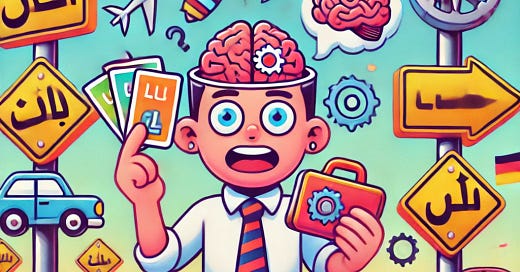Why L2 Feels Like Rocket Science (Hint: It's Not)
Learning your first language (L1) as a baby was like being handed a free subscription to the “Talk All You Want” service. You were immersed in conversations 24/7—parents chatting, caregivers gossiping, and random uncles telling the same jokes over and over. Without realizing it, you picked up words, sentence structures, and even regional slang like a pro.
But now? Welcome to the wonderful world of L2, where words won’t stick unless you shove them into your brain with flashcards and verb tables. Suddenly, grammar rules become the new bedtime horror stories, and pronunciation? Forget it—your tongue twists like a pretzel trying to say Schwarzwälder Kirschtorte or السلام عليكم.
Why L1 Was a Breeze, and L2 Feels Like a Workout
Let’s face it—learning L1 was pure survival mode. You needed to understand “Stop that!” and “Time for dinner!” just to stay alive. L2, on the other hand, often comes with optional motivation. Whether it’s impressing your crush from Berlin, prepping for a trip to Dubai, or upgrading your career prospects, L2 is usually more "I should probably do this" than "I need to do this right now."
The mental shift between those two realities is where the real challenge lies. As an adult, learning L2 is less osmosis and more intentional brain push-ups—structured lessons, memorization drills, and awkward Zoom calls with conversation partners.
When L1 Tries to Sabotage Your L2 Journey
Your L1 can be your best friend or your worst enemy when picking up an L2. Here’s how:
Positive Transfer: “Hey! This is just like in my first language!”
Example: English and German share words like Hotel and Universität. That’s a freebie—take it and run.Negative Transfer: “Why does this sound wrong… but also kinda right?”
Example: If you think Ich bin 25 Jahre alt in German directly translates to “I am 25 years old,” you're good! But try that approach with Arabic: أنا 25 سنة (“I am 25 years”), and you'll have locals scratching their heads. L1 habits don’t always play well with L2 rules.
Pronunciation: The Tongue Twister Chronicles
Learning L2 means becoming a contortionist—linguistically speaking. In Arabic, you might struggle with sounds like ع (a throaty “aa”) that simply don’t exist in English. In German, vowels like ü will make your lips do things they’ve never done before.
But here’s a secret: No one expects you to sound perfect (unless you're auditioning for a James Bond villain). You just need to be understood, and some mistakes will make great stories. Imagine confidently asking for “butt” (der Po) instead of soup (die Suppe) at a German restaurant. Trust me, it happens to the best of us.
Grammar: A Puzzle or a Prison?
Grammar in L2 can feel like learning algebra all over again. Arabic’s triliteral root system and German’s infamous case system (Nominative, Accusative, Dative, Genitive) can have you questioning your life choices. But here’s the thing: The sooner you stop demanding perfection and embrace the chaos, the faster you’ll progress.
Pro tip: Learn phrases as chunks instead of obsessing over each word. For example:
Arabic: "كيف حالك؟" (Kayfa haluka? / How are you?)
German: "Wie geht’s?" (How’s it going?)
These chunks are lifesavers in real-world conversations, where speed trumps grammar perfection.
Immersion Hacks for Adults (No Diapers Required)
Babies learn languages through full immersion—lucky them! But adults can simulate this by surrounding themselves with the target language:
Podcasts & Audiobooks: Listen to German podcasts like Slow German or Arabic news segments from Al Jazeera.
YouTube & TV Shows: Watch your favorite shows dubbed in L2. It’s more fun than drilling conjugations.
Find Language Buddies: Join online meetups or apps like Tandem to chat with native speakers. Your mistakes will turn into learning moments, and who knows? You might make new friends along the way.
Don’t Let the Plateau Get You Down
Every L2 learner hits the dreaded plateau—that frustrating stage where progress feels non-existent. You’re not adding new words fast enough, and grammar still feels like an uphill battle. But this is normal! Here’s how to power through:
Mix it Up: Switch between reading, writing, listening, and speaking to keep things fresh.
Reward Yourself: Treat yourself for milestones—whether it’s reading a short story in L2 or having a three-minute conversation without switching to English.
Take a Break, but Don’t Quit: Language learning is a marathon, not a sprint. It’s okay to take a breather—just don’t give up.
Sign-Off: Learn the Language, Enjoy the Journey
Transitioning from L1 to L2 may feel like a rollercoaster, but it’s also one of the most rewarding rides you’ll ever take. With every awkward conversation and misunderstood phrase, you're becoming more fluent—not just in words, but in cultural understanding and human connection.
So, keep going! Before you know it, you'll be impressing people with your multilingual prowess. And if nothing else, you'll have some hilarious stories about the times you ordered “butt” instead of soup.
PS: Did you know the German word for “speed limit” is Geschwindigkeitsbegrenzung? If you can pronounce that correctly on your first try, you’ve officially reached legend status.






Share this post